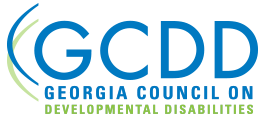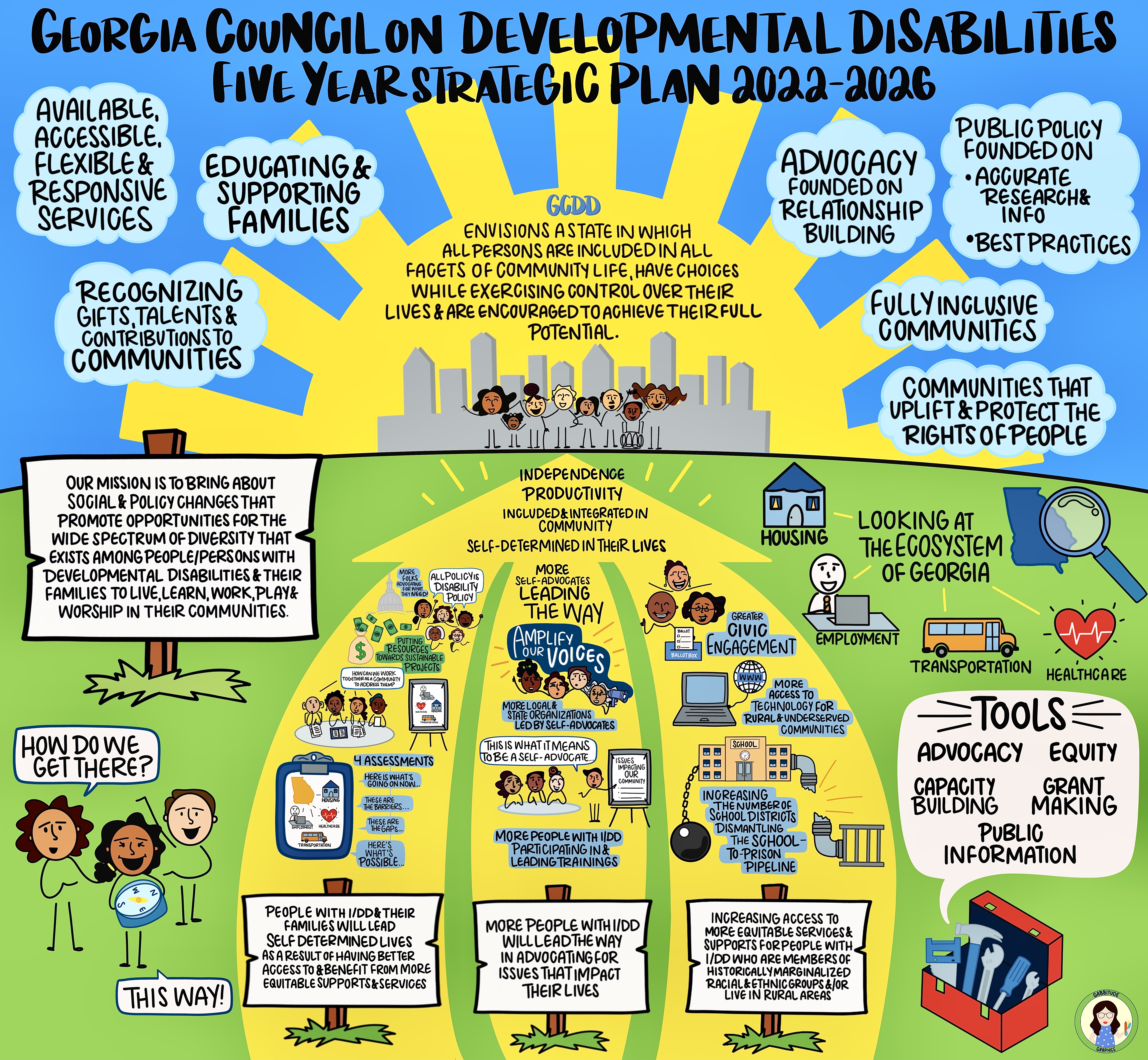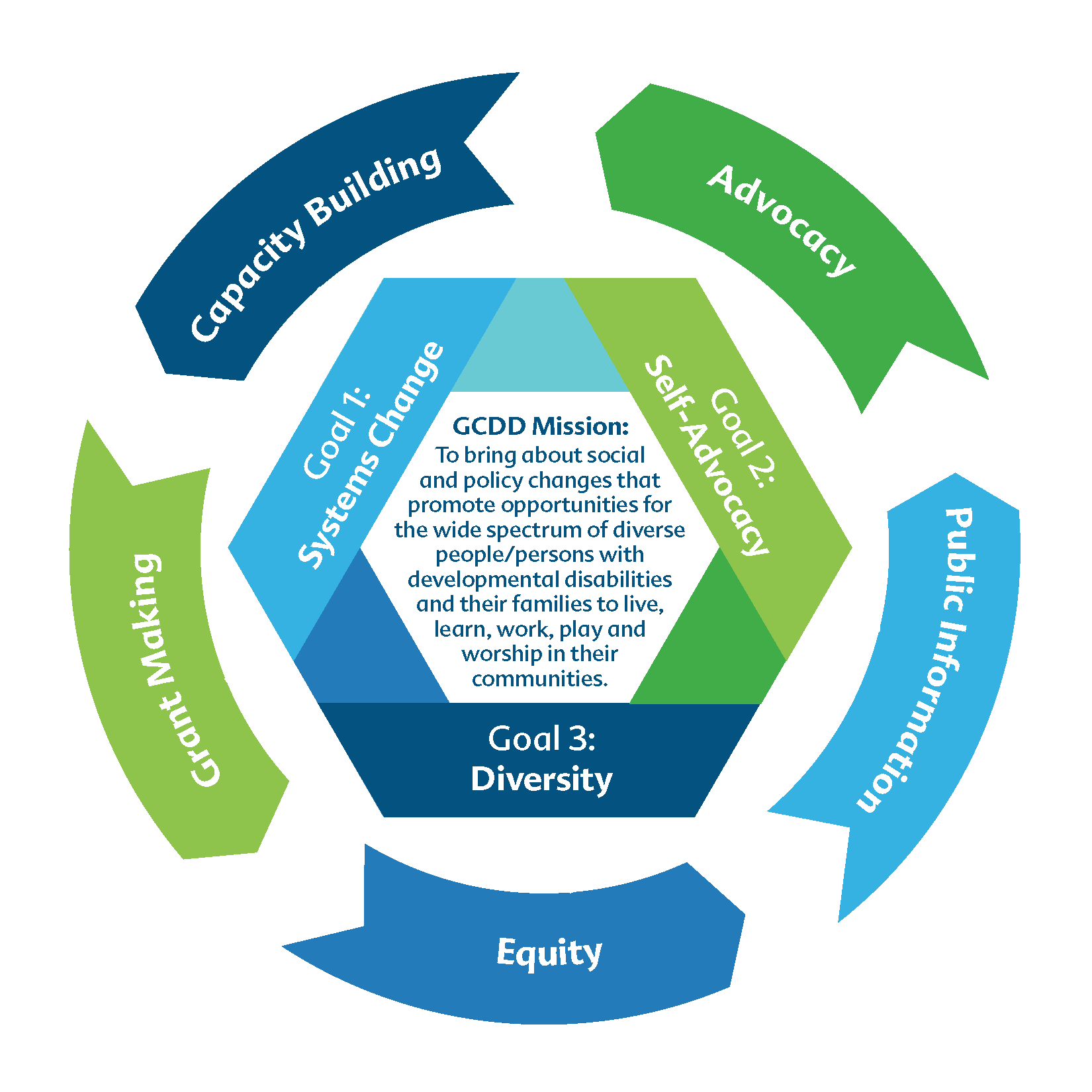NOFAs (Notice of Funds Available) (2)
GCDD Announces New NoFA for Program Evaluation Consultant
23ADM1: Program Evaluation Consultant
The purpose of this Notice of Funds Available (NoFA) is to solicit proposal from a Program Evaluation Consultant who will work to construct and execute a plan for both process and outcome evaluation across all GCDD activities. The consultant will assist GCDD in ensuring the agency is measuring impact in a way that is meaningful for our consumers and useful for Federal accountability.
Grant amount is $50,000. Applications for this grant are due by February 1, 2023. This notice was posted on December 1, 2022. The start date is March 1, 2023 and the end date is October 31, 2023.
Scope of Work
The Georgia Council on Developmental Disabilities is accepting proposals from program evaluation firms and professionals to provide support to the organization members and staff as it relates to programmatic process and outcome evaluation. This will be an 8-month contract, eligible to renewed on an annual basis based on performance and agreement among staff and members that evaluation support is still required.
The Consultant will perform the services and responsibilities as outlined below:
- Develop a comprehensive evaluation plan that identifies annual process and outcome evaluation activities across all GCDD programs that provides meaningful data to both the consumer (people with intellectual and developmental disabilities and their families) and our Federal partners. Activities might include:
- Describing the programs and processes to be evaluated and developing the evaluation focus
- Identifying and collaborating with stakeholders
- Selecting models, methods or designs to support the evaluation that uses best practices found in the relevant literature
- Devising Data Collection Strategies to Support the Evaluation Questions and Design
- Emphasizing evaluation techniques that can be implemented “in-house” (by current GCDD staff) as well as evaluation techniques that may require outside contracting
- Ensuring the final evaluation plan is actionable and replicable
- Execute the developed evaluation plan by evaluating the process and outcomes of GCDD’s current projects. The evaluation of projects should consist of the minimum:
- Assisting the projects in improving their operations
- Assisting GCDD staff and Council members in determining the success of current projects and making decisions on how best to proceed with future project decisions
- Involving community members who are participating or have participated in the projects
- Assessing the projects’ processes, specifically how they are implementing the program
- Assessing the projects’ outcomes
Restrictions on Communication
All questions about this NoFA must be submitted in the following format: Organization/Individual Name 1. Question Citation of relevant section of the NoFA 2. Question Citation of relevant section of the NoFA Questions must be directed in writing to the Operations & Contracts Director (OCD) Lisa Eaves at: .
Questions must include the company name and the referenced NoFA section. From the issue date of this NoFA until a contractor is selected and the selection is announced, Applicants are not allowed to communicate for any reason with any State staff except through the OCD, or during the Applicants' conference, or as provided by existing work agreement(s). The State reserves the right to reject the proposal of any Applicant violating this provision.
All questions concerning this NoFA must be submitted in writing by email to . Only written questions will be accepted (No phone calls please). No response other than written will be binding upon the State. All questions and answers will be responded to via email within 3 business days. Questions and answers will also be posted to the GCDD website: www.gcdd.org.
The DD Council
The Georgia Council on Developmental Disabilities (GCDD) is one of 56 entities of its type in the United States and territories that report to the U.S. Department of Health and Human Services and the Administration for Community Living. It is authorized under Public Law 106-402, the Developmental Disabilities Assistance and Bill of Rights Act Amendments of 2000.
The Georgia Council on Developmental Disabilities (GCDD) makes funds available to fulfill its mission in accordance with its Five-Year Strategic Plan (pdf file) and in compliance with the American with Disabilities Act (ADA). Through its funding, GCDD works to increase the capacities and resources of public and private nonprofit entities and others to develop a comprehensive community system that responds to the choices, capabilities and needs of persons with developmental disabilities and their families. The purpose of GCDD grants is to expand best practices and contribute to system-wide changes that support the rights of people with developmental disabilities and their full inclusion as community members. Recipients of GCDD grants are expected to be ongoing partners in bringing about positive change.
Our activities are governed by a 27-member board, appointed by the Governor and comprised of at least 60 percent individuals with developmental disabilities and family members. Other members include policymakers that represent various federally mandated partners and state agencies and organizations having a vested interested in persons with developmental disabilities.
GCDD is charged with creating systems change for people with developmental disabilities and their families by increasing opportunities for independence, inclusion, integration, productivity, and self-determination. Activities include public policy research and analysis, project demonstrations, education and training, advocacy, and public information. The GCDD is a quasi-state agency, attached to the Department of Behavioral Health and Developmental Disabilities (DBHDD) for administrative purposes.
Schedule of Events
This Request for Proposals will be governed by the following schedule:
- Applications Due – February 1, 2023
- Staff Application Review – February 3, 2023 – February 5, 2023
- Grants Selection Committee Review – February 5, 2023 – February 17, 2023
- Contract Negotiations and Signed Contracts – February 20, 2023 – February 28, 2023
- Start Date/Work Begins – March 1, 2023
APPLY AT: https://www.ddsuite.org/?nofa_id=2018
23ADM1 Evaluation Consultant NOFA Q&A
- Under the Scope of Work- Request for Proposals, the scope of work states that designing an evaluation plan is a deliverable. However, under the Application Submission & Evaluation section, one of the questions for criteria used includes this question: Does the evaluation plan satisfactorily describe both process and outcomes evaluation approaches?
Is it expected that the proposal includes an evaluation plan or an estimate of what developing the plan in partnership with the GA Council would cost?
It is not expected that the proposal would include a fully developed evaluation plan. The proposal would primarily serve as an overview of the work the grantee would propose doing, what the activities, outcomes, and overall timeline would look like, and how much that would cost. We will be looking to the experts in this area to help us best develop an evaluation plan and would like proposals to help us assess how someone might go about that work. - Under Specifications, who is providing the $12, 500 match or is the consultant expected to contribute to the match requirement?
The match is provided via the consultant; however, that match can be comprised of staff time, rent & utilities, etc. - CES used a participatory approach and typically involve key stakeholders include those with lived experience. Under the Scope of Work- Request for Proposals - #2 Execute the developed evaluation plan, it is mentioned: 2. Assisting GCDD staff and Council members in determining the success of current projects and making decisions on how best to proceed with future project decisions; and 3: Involving community members who are participating or have participated in the projects.
To what extent of staff, council members and people with lived experience been included in past evaluation work? Is there an internal group that would be tasked to working with the evaluation consultant?
Work focusing on how best to evaluate the Council’s initiatives has not been conducted while I have been staff. We do have a committee of council/staff members who are focused on improving this area and would be available to work with the consultant. GCDD’s staff that would be closely involved with the ongoings of this work would be myself, Lisa, and our Executive Director D’Arcy. - Application Submission and Evaluation, Financial Cost Proposal Evaluation
According to https://www.ojp.gov/tfsc/matching_or_cost_sharing_requirements_guide_sheet_508#:~:
text=An%20in%2Dkind%20match%20may,allowable%20under%20that%20federal%20program, third-party in-kind matching includes, but is not limited to, "the valuation of non-cash contributions provided by a third party. An in-kind match may be in the form of services, supplies, real property, and equipment. The value of the service may be used for the matching requirements, if the services are necessary, reasonable, and allowable under that federal program. Grantees are allowed to use unrecovered indirect costs for matching or cost sharing requirements; however, this requires prior approval of the federal awarding agency."
I want to use the value of the service for the matching requirement, meaning I would like to provide 100 hours of my time at $125/hour at no cost to the project - is this acceptable?
YES, value of service is an acceptable form of match. - Supporting Documents, GCCD Grant Application Process: A Guide to DD Suite.
On page 6 of the Guide to DD Suite, in the section called PEOPLE, it states "GCDD asks that each application include no less than three (3) key individuals related to the project. This includes the Project Director, the Project Financial Officer, and the Organization Director."
I am an independent evaluation consultant and I manage all projects and financial and administrative aspects of my company and the work. Can these three individuals be the same person (e.g. me)?
YES. Enter your name into DD Suite for each role. - Is the match something in all our RFPs? Do you have a sample budget of how a match is documented within a selected grant application?
Cost sharing or matching means the portion of project costs not paid by Federal funds/GCDD Funds.
Match is required by the DD Act and supported in regulations and instructions and is also a term and condition for accepting federal funds.
There are some exceptions where matching funds are not required.
Match Funds are required for this grant!
What kind of things can be considered in-kind match?
Your in-kind match may include expenses that are:
• allowable under federal guidelines and Council policies;
• necessary for your project;
• not paid by federal funds (ours or those of another agency); and
• not already being used as match for another federal grant.
Some examples include office space, utilities, volunteer time (including members of your Project Advisory Committee), printing costs, consultants (if not paid through the grant), or staff not paid for through the grant. We do not currently provide samples of completed applications. - Is there the potential for related evaluation work to carry over into next year's budget? Would that be a continuation or new grant application process?
Funds have been approved for Fiscal-Year 2023. The next phase of the evaluation has not yet been determined. It is hoped that the selected Evaluation Consultant will assist with recommendations for the next phase. Evaluation is an important part of our 5-year strategic plan, and we anticipate that additional funds will be made available. However, the amount is to be determined. Each year between July and October the Council votes on a budget for the next year.
Applicants must re-apply each year for continuation of funds. Renewal applicants will not have to compete for continued funding but a simplified application and work plan for the next phase of the project is expected. - Is there any flexibility on the deadline?
The original deadline was 1/3/2023. The NoFA was reposted, and the application deadline was extended to 2/1/2023. Applications receive by the deadline will be evaluated. Late applications will not be accepted. The Council may decide to repost the NoFA or extend the deadline if a qualified applicant is not selected.
It is our hope that this project will start 3/1/2023 so that we will have a good evaluation plan in place by our next fiscal year (October 1, 2023). - I noticed in the RFP that there is a match of funds for $12,500 and in your email above, line 6 and 7; can the match requirement be in labor provided in the scope of work and do we necessarily need to have match funds from a contributor. I look forward to hearing from you soon.
Yes, labor can be used towards match funds. No, match does not have to come from an outside contributor. See the above responses for a more detailed description of match funds.
 The Georgia Council on Developmental Disabilities (GCDD) is the state's leader in advancing public policy on behalf of persons with developmental disabilities. Our mission is to promote public policy that creates an integrated community life for persons with developmental disabilities, their families, friends, neighbors and all who support them. We achieve this mission by sharing information, coordinating public outreach and implementing strategic legislative advocacy.
The Georgia Council on Developmental Disabilities (GCDD) is the state's leader in advancing public policy on behalf of persons with developmental disabilities. Our mission is to promote public policy that creates an integrated community life for persons with developmental disabilities, their families, friends, neighbors and all who support them. We achieve this mission by sharing information, coordinating public outreach and implementing strategic legislative advocacy.



